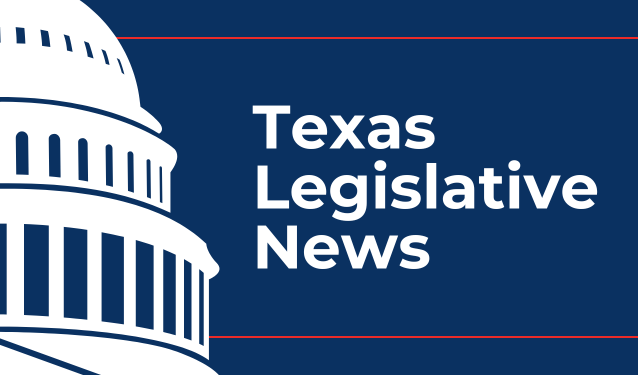

Table of Contents
Welcome to the latest edition of Texas Legislative News for the 89th Texas Legislature. In this regular feature, we provide information on disability-related issues and bills under consideration at the State Capitol. We also explain how lawmakers conduct business, and we share details on upcoming TCDD events.
Draft Budgets Released
Last week, lead appropriators in the House and Senate each released their initial versions of the two-year state budget. The Senate draft would spend nearly $333 billion over the course of the biennium, an $11.6 billion increase over what was approved by lawmakers last session. The House would spend slightly more, coming in at $335.7 billion. These totals would consist of state general revenue, federal dollars, and other funding streams.
The drafts have similarities among their big-ticket items, including:
- $6.5 billion to maintain border security operations;
- $5 billion in additional funding for public schools;
- $3.5 billion for new property tax cuts;
- $3 billion for a proposed Dementia Prevention and Research Institute; and
- $1 billion for a private school voucher program.
In disability policy, each version would raise the base pay rate for community attendants to $12 per hour. Both versions would increase spending on Early Childhood Intervention services by $18 million.
Again, these drafts represent initial proposals. Lawmakers have a great deal of work to do before they approve the final state budget. They will also need to decide whether to spend an anticipated $24 billion surplus or any of the state’s $28.5 billion economic stabilization fund, also known as the “rainy day fund.”
We will track the developments and provide updates throughout the session. You can find key budget documents and summaries on the Legislative Budget Board’s website.
House Rules Approved
On Jan. 23, the Texas House adopted House Resolution 4, which spells out the rules by which the body will operate this session. The rules generally change little from session to session, but this latest revision has a few significant adjustments related to committees. These include a modification to the actual roster and membership of committees, as well as new rules related to committee leadership.
Under the new rules, a variety of committees from last session have been eliminated, renamed, or had their duties transferred to other committees. Several new committees have also been created. The changes include:
- The Business and Industry Committee was eliminated, with its duties shifted to the new Trade, Workforce, and Economic Development Committee.
- The County Affairs, International Relations and Economic Development, and Urban Affairs committees were all eliminated, with most of their work rolled into a new Intergovernmental Affairs Committee.
- The Defense and Veterans’ Affairs Committee was eliminated, with its duties shifted to an expanded Homeland Security, Public Safety, and Veterans’ Affairs Committee.
- The Juvenile Justice and Family Issues Committee was eliminated, with its duties divided between the Criminal Jurisprudence and Judiciary and Civil Jurisprudence committees.
- The Resolutions Calendars Committee was eliminated and merged into the Local and Consent Calendars Committee.
- The State Affairs Committee remains but will have some of its oversight duties shifted to a new Committee on Delivery of Government Efficiency.
A number of committees now have permanent standing subcommittees to tackle specific areas of interest. The number of members on many committees has also increased.
Another change to the rules was more political in nature. The chairs of each standing committee now must be selected from the party holding a majority of seats in the House. This change was championed for a number of years by some Republican leaders, including Lt. Gov. Dan Patrick. The practical result of the change will prevent Democrats, who have not held a majority in the House for over two decades, from leading any committees.
Proponents of the change argue that Democratic chairs have helped stall a conservative mandate in the Legislature, while critics of the move say it will increase partisanship and lead to more gridlock in the House. In what appears to be a compromise, more formal powers and responsibilities have been given to committee vice-chairs, which under the new rule will be members of the minority party.
With the rules adopted, House members now await their committee assignments. The House speaker should announce assignments in the next few weeks.
State of the State
Gov. Greg Abbott will give his State of the State address at 5 p.m. CT on Sunday, Feb. 2. The address is an opportunity for the governor to tout Texas success stories, indicate challenges facing the state, lay out his policy priorities for the session, and release his list of emergency items that lawmakers can take up for consideration immediately.
Traditionally, Texas governors have given their addresses at the State Capitol before members of the House, Senate, and Texas Supreme Court. But in recent legislative sessions, Abbott has given the address through a live telecast from an outside location. Sunday’s address will be broadcast on Nexstar television stations across the state.
Bill Filing Continues
Two weeks into the legislative session, lawmakers have filed over 3,000 bills to consider in the coming months. Recently filed proposals related to disability issues include:
- House Bill (HB) 1936 by Rep. David Cook, relating to citations for the unauthorized use of parking designated for people with disabilities.
- HB 1941 by Rep. Liz Campos, relating to peer-support specialists for people with developmental disabilities (DD) and peer services for those individuals under Medicaid.
- HB 1995 by Rep. Ana Hernandez, relating to vehicle owners being able to notify law enforcement through their vehicle registration that the vehicle owner may be transporting a person with a disability.
- HB 2081 by Rep. John Bucy III, relating to establishing the Building Better Futures Program to support educational and occupational skills training and support services for students with DD at public and private institutions of higher education.
- HB 2096 by Rep. Armando “Mando” Martinez, relating to drivers being able to notify law enforcement through their vehicle registration that a driver has a health condition or disability that could impact effective communication.
- Senate Bill (SB) 752 by Sen. José Menéndez, relating to measures to ensure the safety of people with disabilities during emergency situations at public postsecondary institutions.
- SB 769 by Sen. José Menéndez, relating to a report by the Texas Higher Education Coordinating Board regarding enrollment and success in higher education for students with disabilities.
- SB 828 by Sen. Tan Parker, relating to the provision of services by the Texas Department of Criminal Justice to offenders with DD.
Arc of Texas Advocacy Day
Our friends at The Arc of Texas will host a statewide advocacy event on Valentine’s Day, Feb. 14. Have a Heart for The Arc Day is a fun way to show your disability rights pride and advocate for Texans with DD. For this year’s event, the Arc will focus on strengthening the direct-care workforce. You can participate by visiting state lawmakers in person or by emailing postcards to their offices. Visit The Arc of Texas website for more details.
Stay Informed
Throughout the 89th Texas legislative session, you can stay up to date on how lawmakers address disability issues by following us on Facebook, X, Instagram, and LinkedIn. You can also check out our Policy section to learn more about our legislative engagement and find resources to support your own advocacy.
